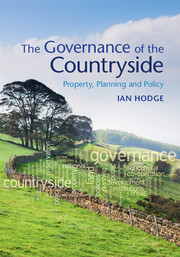Book contents
- Frontmatter
- Contents
- Preface
- Acknowledgements
- List of abbreviations
- Part I Introduction
- Part II Historical models
- Part III Governance under sectoral policies
- 6 Agricultural policies, farming and the environment
- 7 Land, development and planning
- 8 Protected Areas: the example of National Parks
- 9 Wildlife conservation: National Nature Reserves, Sites of Special Scientific Interest and Large-scale Conservation Areas
- 10 Public rights of way and access to the countryside
- 11 The control of agricultural pollution
- 12 The development of agri-environment policy
- Part IV Alternative approaches to governance
- Part V Conclusions
- References
- Index
6 - Agricultural policies, farming and the environment
from Part III - Governance under sectoral policies
Published online by Cambridge University Press: 05 February 2016
- Frontmatter
- Contents
- Preface
- Acknowledgements
- List of abbreviations
- Part I Introduction
- Part II Historical models
- Part III Governance under sectoral policies
- 6 Agricultural policies, farming and the environment
- 7 Land, development and planning
- 8 Protected Areas: the example of National Parks
- 9 Wildlife conservation: National Nature Reserves, Sites of Special Scientific Interest and Large-scale Conservation Areas
- 10 Public rights of way and access to the countryside
- 11 The control of agricultural pollution
- 12 The development of agri-environment policy
- Part IV Alternative approaches to governance
- Part V Conclusions
- References
- Index
Summary
There must be something completely out of joint, when the Government are afraid of the effects of a good crop.
William Cobbett, Rural Rides, first published 1830 (Penguin English Library, 1967, p. 132)He was a long-limbed farmer,…, who held that federal aid to anyone but farmers was creeping socialism.…His specialty was alfalfa, and he made a good thing of not growing any. The government paid him well for every bushel of alfalfa he did not grow. The more alfalfa he did not grow, the more money the government gave him, and he spent every penny he didn't earn on new land to increase the amount of alfalfa he did not produce…. He invested in land wisely and soon was not growing more alfalfa than any other man in the country.
Joseph Heller, Catch 22, first published in 1955 (Corgi Books, London, 1964, pp. 94–95)6.1 Introduction
Agricultural policy has a central influence on rural land use and environment. Over the years, governments have adopted different approaches towards agricultural policy, sometimes offering protection and sometimes favouring free trade. Debates about policy have sometimes had a very high public profile, such as was the case with the Corn Laws. The repeal of the Corn Laws in 1846 heralded a period of international competition that was a major factor in the agricultural depression later that century which in turn undermined the financial position of many Great Estates. The First World War in 1914–18 stimulated a brief period of protection for agriculture, but this was not maintained and agriculture went through a further period of recession in the 1930s. However, legislation introduced following the Second World War established a basis for support for agriculture in the UK that was to last for the rest of the century. Entry into the European Common Market in 1973 and the adoption of the Common Agricultural Policy (CAP) altered the policy approach and shifted the focus of policy making from London to Brussels, but the principle of active support has been retained, continuing in the European Union scheme for agricultural policy beyond 2014.
This chapter outlines the approaches that have been adopted towards agricultural support over the period since the Second World War and reviews their implications for farmers, taxpayers, consumers and the countryside.
- Type
- Chapter
- Information
- The Governance of the CountrysideProperty, Planning and Policy, pp. 109 - 141Publisher: Cambridge University PressPrint publication year: 2016



